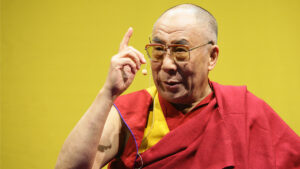Mindful, Selfless, and Compassionate
Harvard Business Review
Andreas Rentz/Getty Images
Summary.
The Dalai Lama shares his observations on leadership and describes how our “strong focus on material development and accumulating wealth has led us to neglect our basic human need for kindness and care.” He offers leaders three recommendations. First, to be mindful: “When we’re under the sway of anger or attachment, we’re limited in our ability to take a full and realistic view of the situation.” Also, to be selfless: “Once you have a genuine sense of concern for others, there’s no room for cheating, bullying, or exploitation; instead you can be honest, truthful, and transparent in your conduct.” And finally, to be compassionate: “When the mind is compassionate, it is calm and we’re able to use our sense of reason practically, realistically, and with determination.”
by the Dalai Lama with Rasmus Hougaard
What can leaders do?
Be mindful
Cultivate peace of mind. As human beings, we have a remarkable intelligence that allows us to analyze and plan for the future. We have language that enables us to communicate what we have understood to others. Since destructive emotions like anger and attachment cloud our ability to use our intelligence clearly, we need to tackle them.
Fear and anxiety easily give way to anger and violence. The opposite of fear is trust, which, related to warmheartedness, boosts our self-confidence. Compassion also reduces fear, reflecting as it does a concern for others’ well-being. This, not money and power, is what really attracts friends. When we’re under the sway of anger or attachment, we’re limited in our ability to take a full and realistic view of the situation. When the mind is compassionate, it is calm and we’re able to use our sense of reason practically, realistically, and with determination.
Be selfless
We are naturally driven by self-interest; it’s necessary to survive. But we need wise self-interest that is generous and cooperative, taking others’ interests into account. Cooperation comes from friendship, friendship comes from trust, and trust comes from kindheartedness. Once you have a genuine sense of concern for others, there’s no room for cheating, bullying, or exploitation; instead, you can be honest, truthful, and transparent in your conduct.
Be compassionate
The ultimate source of a happy life is warmheartedness. Even animals display some sense of compassion. When it comes to human beings, compassion can be combined with intelligence. Through the application of reason, compassion can be extended to all 7 billion human beings. Destructive emotions are related to ignorance, while compassion is a constructive emotion related to intelligence. Consequently, it can be taught and learned.
Buddhist tradition describes three styles of compassionate leadership: the trailblazer, who leads from the front, takes risks, and sets an example; the ferryman, who accompanies those in his care and shapes the ups and downs of the crossing; and the shepherd, who sees every one of his flock into safety before himself. Three styles, three approaches, but what they have in common is an all-encompassing concern for the welfare of those they lead.”
Full piece:

Leave a Reply